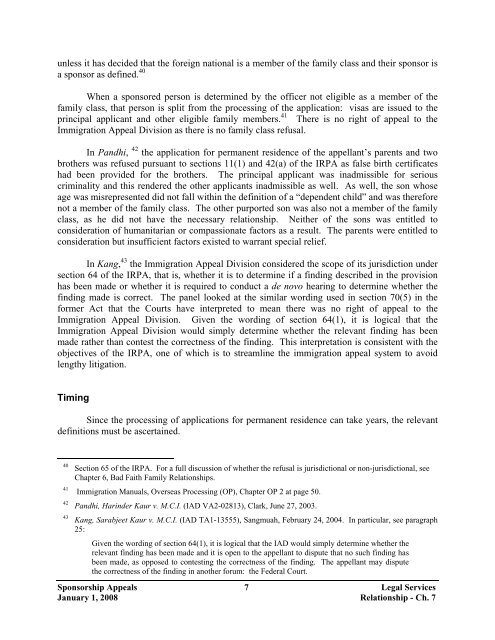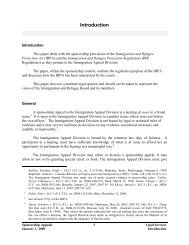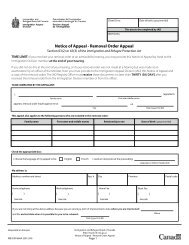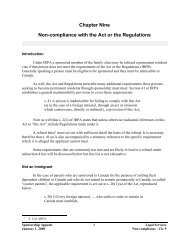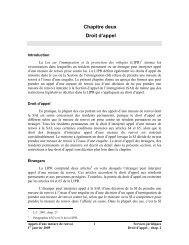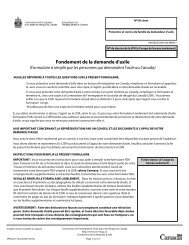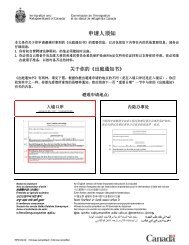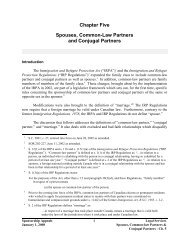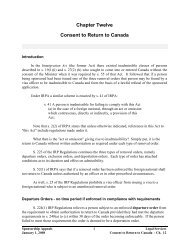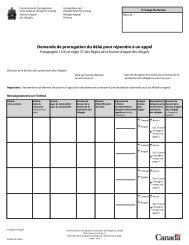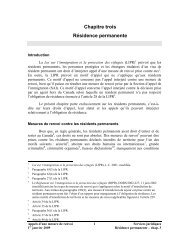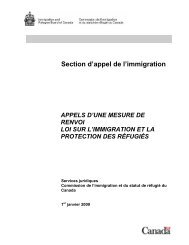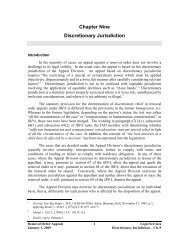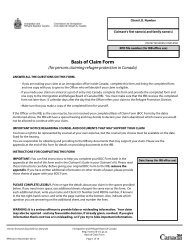Sponsorship Appeals - Immigration and Refugee Board of Canada
Sponsorship Appeals - Immigration and Refugee Board of Canada
Sponsorship Appeals - Immigration and Refugee Board of Canada
Create successful ePaper yourself
Turn your PDF publications into a flip-book with our unique Google optimized e-Paper software.
unless it has decided that the foreign national is a member <strong>of</strong> the family class <strong>and</strong> their sponsor is<br />
a sponsor as defined. 40<br />
When a sponsored person is determined by the <strong>of</strong>ficer not eligible as a member <strong>of</strong> the<br />
family class, that person is split from the processing <strong>of</strong> the application: visas are issued to the<br />
principal applicant <strong>and</strong> other eligible family members. 41 There is no right <strong>of</strong> appeal to the<br />
<strong>Immigration</strong> Appeal Division as there is no family class refusal.<br />
In P<strong>and</strong>hi, 42 the application for permanent residence <strong>of</strong> the appellant’s parents <strong>and</strong> two<br />
brothers was refused pursuant to sections 11(1) <strong>and</strong> 42(a) <strong>of</strong> the IRPA as false birth certificates<br />
had been provided for the brothers. The principal applicant was inadmissible for serious<br />
criminality <strong>and</strong> this rendered the other applicants inadmissible as well. As well, the son whose<br />
age was misrepresented did not fall within the definition <strong>of</strong> a “dependent child” <strong>and</strong> was therefore<br />
not a member <strong>of</strong> the family class. The other purported son was also not a member <strong>of</strong> the family<br />
class, as he did not have the necessary relationship. Neither <strong>of</strong> the sons was entitled to<br />
consideration <strong>of</strong> humanitarian or compassionate factors as a result. The parents were entitled to<br />
consideration but insufficient factors existed to warrant special relief.<br />
In Kang, 43 the <strong>Immigration</strong> Appeal Division considered the scope <strong>of</strong> its jurisdiction under<br />
section 64 <strong>of</strong> the IRPA, that is, whether it is to determine if a finding described in the provision<br />
has been made or whether it is required to conduct a de novo hearing to determine whether the<br />
finding made is correct. The panel looked at the similar wording used in section 70(5) in the<br />
former Act that the Courts have interpreted to mean there was no right <strong>of</strong> appeal to the<br />
<strong>Immigration</strong> Appeal Division. Given the wording <strong>of</strong> section 64(1), it is logical that the<br />
<strong>Immigration</strong> Appeal Division would simply determine whether the relevant finding has been<br />
made rather than contest the correctness <strong>of</strong> the finding. This interpretation is consistent with the<br />
objectives <strong>of</strong> the IRPA, one <strong>of</strong> which is to streamline the immigration appeal system to avoid<br />
lengthy litigation.<br />
Timing<br />
Since the processing <strong>of</strong> applications for permanent residence can take years, the relevant<br />
definitions must be ascertained.<br />
40<br />
41<br />
42<br />
43<br />
Section 65 <strong>of</strong> the IRPA. For a full discussion <strong>of</strong> whether the refusal is jurisdictional or non-jurisdictional, see<br />
Chapter 6, Bad Faith Family Relationships.<br />
<strong>Immigration</strong> Manuals, Overseas Processing (OP), Chapter OP 2 at page 50.<br />
P<strong>and</strong>hi, Harinder Kaur v. M.C.I. (IAD VA2-02813), Clark, June 27, 2003.<br />
Kang, Sarabjeet Kaur v. M.C.I. (IAD TA1-13555), Sangmuah, February 24, 2004. In particular, see paragraph<br />
25:<br />
Given the wording <strong>of</strong> section 64(1), it is logical that the IAD would simply determine whether the<br />
relevant finding has been made <strong>and</strong> it is open to the appellant to dispute that no such finding has<br />
been made, as opposed to contesting the correctness <strong>of</strong> the finding. The appellant may dispute<br />
the correctness <strong>of</strong> the finding in another forum: the Federal Court.<br />
<strong>Sponsorship</strong> <strong>Appeals</strong> 7 Legal Services<br />
January 1, 2008 Relationship - Ch. 7


